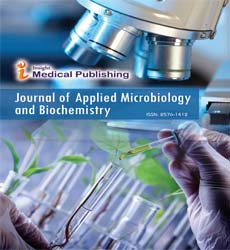ISSN : ISSN: 2576-1412
Journal of Applied Microbiology and Biochemistry
Combatting Microbial Threats Advancements and Challenges in Applied Microbiology
Robert Marm*
Department of Medical Microbiology, University Medical Centre Utrecht, Utrecht, Netherlands
- *Corresponding Author:
- Robert Marm
Department of Medical Microbiology, University Medical Centre Utrecht, Utrecht,
Netherlands,
E-mail: marm@foxmail.com
Received date: January 27, 2024, Manuscript No. IPJAMB-24-18833; Editor assigned date: January 30, 2024, PreQC No. IPJAMB-24-18833 (PQ); Reviewed date: February 13, 2024, QC No. IPJAMB-24-18833; Revised date: February 20, 2024, Manuscript No. IPJAMB-24-18833 (R); Published date: February 27, 2024, DOI: 10.36648/2576-1412.8.1.206
Citation: Robert M (2024) Combatting Microbial Threats Advancements and Challenges in Applied Microbiology. J Appl Microbiol Biochem Vol. 8 No. 1:206.
Description
Applied microbiology, a dynamic field at the intersection of biology, chemistry, and engineering, plays a pivotal role in diverse sectors, ranging from healthcare to environmental protection, agriculture, food industry, and biotechnology. Harnessing the potential of microorganisms, applied microbiology offers innovative solutions to address challenges and enhance various processes. This article delves into the intresting world of applied microbiology, exploring its significance, key applications, and recent advancements.
Application of microbiology in industries
Microorganisms, including bacteria, fungi, viruses, and archaea, constitute the microscopic world that surrounds us. Despite their small size, these organisms wield immense power, influencing ecosystems, human health, and industrial processes. Applied microbiologists leverage their understanding of microorganisms' biology, genetics, and metabolism to manipulate them for beneficial purposes. One of the most critical domains of applied microbiology is healthcare. Microorganisms are extensively studied for their role in disease prevention, diagnosis, and treatment. Antibiotics, for instance, revolutionized medicine by combating bacterial infections. However, the emergence of antibiotic-resistant bacteria underscores the ongoing battle against microbial threats. Moreover, applied microbiology contributes to the development of vaccines, probiotics, and antimicrobial agents. Recent advancements in microbial genomics and synthetic biology have accelerated vaccine development processes, enabling rapid responses to emerging infectious diseases. Microorganisms possess remarkable abilities to degrade pollutants and detoxify contaminated environments. Bioremediation, a technique that utilizes microorganisms to break down hazardous substances, offers a sustainable approach to environmental cleanup. Applied microbiologists design tailored microbial consortia capable of metabolizing specific pollutants, such as hydrocarbons, heavy metals, and pesticides. Furthermore, microbial fuel cells harness the energy generated by microbial metabolism to produce electricity from organic matter, presenting a promising avenue for renewable energy production and wastewater treatment. In agriculture, applied microbiology promotes sustainable practices by enhancing soil fertility, controlling plant pathogens, and improving crop yields. Biofertilizers containing beneficial microorganisms, such as nitrogen-fixing bacteria and mycorrhizal fungi, reduce the reliance on chemical fertilizers, mitigating environmental impacts. Additionally, probiotics and microbial enzymes find applications in the food industry, improving food safety, shelf life, and nutritional value. Fermentation processes, driven by microbial activity, yield a diverse array of products, including cheese, yogurt, and fermented beverages, contributing to culinary traditions worldwide. The biotechnology sector relies heavily on applied microbiology to produce biofuels, pharmaceuticals, enzymes, and biopolymers sustainably. Microbial fermentation serves as a cornerstone for bioprocesses, converting renewable resources into valuable products. Metabolic engineering techniques enable the manipulation of microbial pathways to optimize desired metabolite production, paving the way for bio-based alternatives to petroleum-derived chemicals. Moreover, bioremediation strategies are employed in industrial settings to mitigate pollution and reduce waste generation. Microbial biosensors, equipped with genetically engineered microorganisms, detect pollutants in real-time, facilitating environmental monitoring and remediation efforts.
Challenges and future directions
Despite its myriad applications, applied microbiology faces challenges, including microbial resistance, regulatory constraints, and technological limitations. Addressing these challenges requires interdisciplinary collaborations, and ethical considerations. Looking ahead, applied microbiology holds tremendous potential to address pressing global issues, such as climate change, infectious diseases, and food security. Advances in genome editing, synthetic biology, and machine learning promise to unlock new avenues for microbial manipulation and bioprocess optimization. Applied microbiology continues to transform industries and improve lives through its innovative applications in healthcare, environmental remediation, agriculture, and biotechnology. By harnessing the diverse capabilities of microorganisms, scientists and engineers strive to tackle complex challenges and pave the way for a more sustainable and resilient future. As our understanding of microbial ecosystems deepens and technological capabilities expand, the potential for applied microbiology to drive positive change remains boundless.
Open Access Journals
- Aquaculture & Veterinary Science
- Chemistry & Chemical Sciences
- Clinical Sciences
- Engineering
- General Science
- Genetics & Molecular Biology
- Health Care & Nursing
- Immunology & Microbiology
- Materials Science
- Mathematics & Physics
- Medical Sciences
- Neurology & Psychiatry
- Oncology & Cancer Science
- Pharmaceutical Sciences
